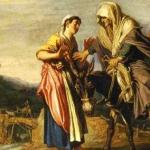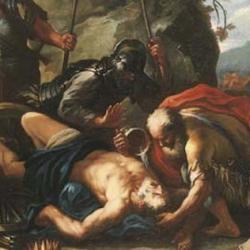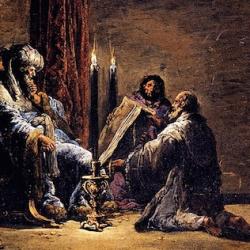The Chronicler’s account of the reign of Amon, son of Manasseh and father of Josiah, is very brief (2 Chronicles 33:21-25). But these few verses hold some treasure.
Like his father, he does evil in the eyes of Yahweh. Throughout 1-2 Chronicles the verb for “doing” evil is ‘asah, which can also mean “make.” “The evil” is not merely in doing certain actions, but in making certain things, or establishing certain laws, habits, patterns of life.
In the case of Amon, that “constructive” sense comes to the fore, as verse 22 chiastically details the sort of evil he did/made:
A. He did/made evil in the eyes of Yahweh
B. according to what Manasseh his father did/made (ka’asher ‘asah menashsheh ‘aviyw).
C. To the graven images
B’. which manasseh did/made (‘asher ‘asah menashsheh ‘aviyw)
A’. sacrificed Amon and served.
B and B’ contain virtually identical clauses, the only difference being in the particle k- at the beginning of the clause in B. At the center of the text is a reference to the things that Manasseh made – graven images – which, A’ tells us, Amon worshiped.
I have followed the Miltonesque word order of the Hebrew the final clause in A’ to bring out the word-picture that the last clause paints. Amon’s name is set between “sacrifice” and “serve,” a sign both of his devotion to idols and of his confinement by the images of his father.
Verse 23 is the kicker: Manasseh did just what Amon did, but eventually humbled himself and put away the idols (33:14-15). Amon doesn’t humble himself and so adds guilt to guilt. Manasseh suffered a brief exile because of his idolatry, an exile cut short by his repentance. The text raises the question: What will happen to Amon, who serves idols and does not humble himself? What sort of exile awaits him?
With that question ringing in our minds, we can see a glimmer of hope and mercy in the text. Manasseh was the first of Judah’s kings to set up graven images (2 Chronicles 33:19; pesiyliym). Amon also worships them, but his son Josiah devotes most of his energy to knocking them down and grinding them to powder (34:3, 4, 7).
Still, the trajectory of Judah’s worship is clear. For centuries, their kings have failed to be perfectly faithful to Yahweh. Even the best of them have tolerated high places, and some set up altars for false gods (e.g., Ahaz).
But erecting graven images is new, and it’s a sign of the deepening “Canaanitization” of Judah. If left to themselves, Judah will eventually end up as packed with images as the Canaanites themselves (cf. pasiyl in Deuteronomy 7:5, 25; 12:3).
From this angle, the exile is an act of severe grace. Rather than allow Judah to become fully paganized, Yahweh uproots them from the land and casts them among the nations. Surrounded by idolatry, they are called to maintain their distinctiveness. And they do, as the experience of Daniel, his three friends, and other heroes of the exile demonstrates.
Exile cuts off Judah’s trajectory. Exile is an extreme remedy for idolatry. But the remedy works. When Jews return from exile, they are no longer tempted to erect images or worship false gods.
















